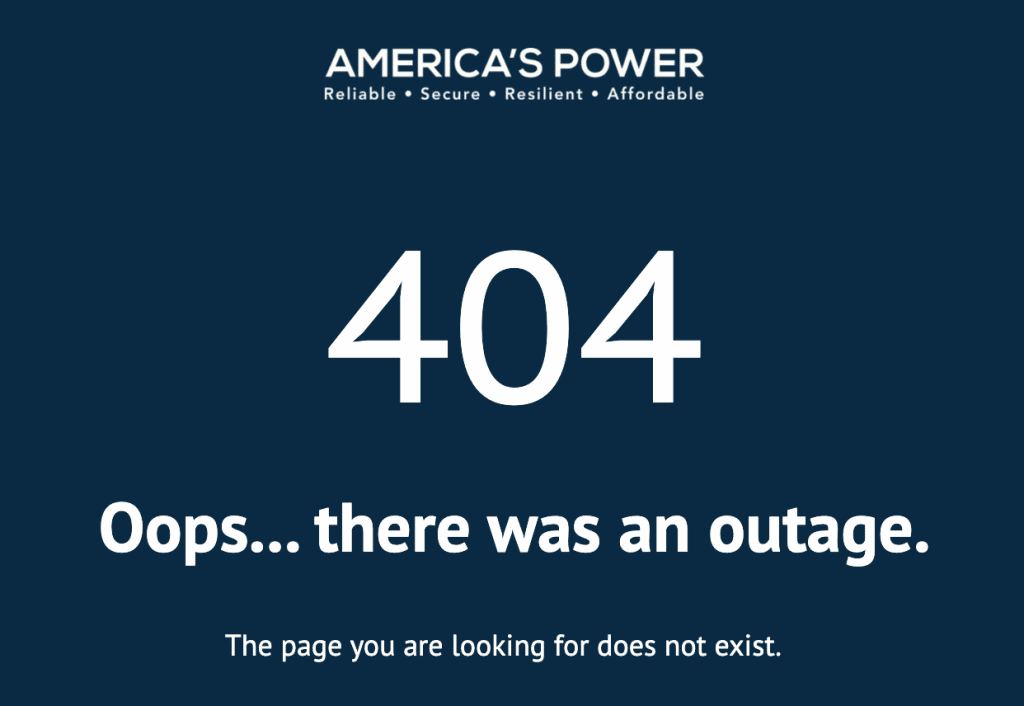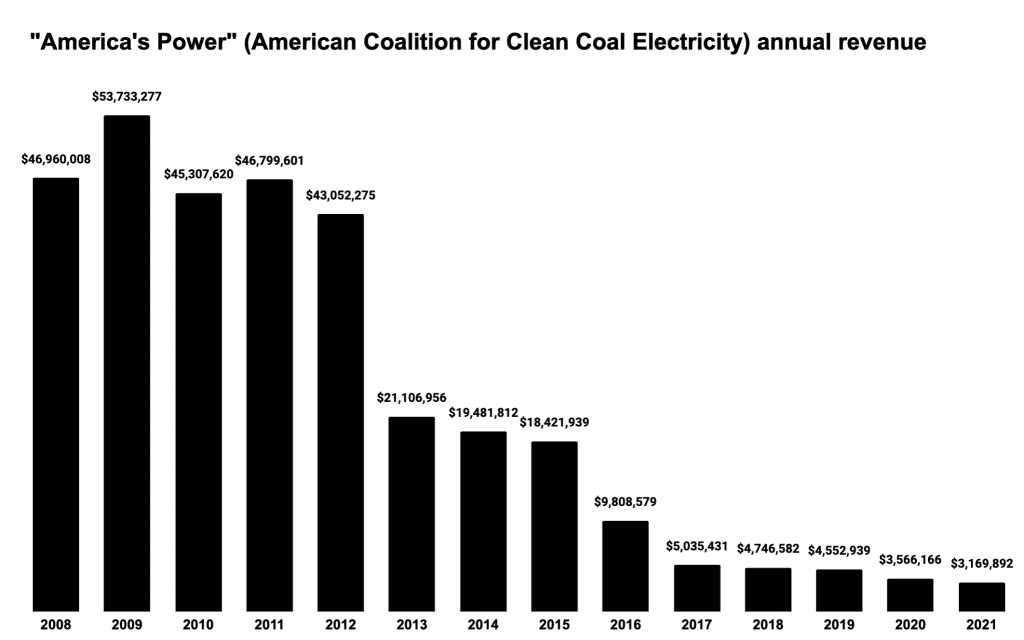A coal industry group focused on keeping coal plants from retiring has lost all of its members that are investor-owned utilities and railroads, and recently deleted the list of member companies from its website. In a sign of the declining political power of the once-broad coalition of coal-supporting interests, “America’s Power” members now consist mostly of coal mining companies, along with a few smaller power companies that account for just 6.25% of US coal generation.
The group describes itself as “a partnership of industries involved in producing electricity from coal,” and seeks to influence regulators that make decisions about electric utility operations. The CEO of America’s Power, Michelle Bloodworth, told Federal Energy Regulatory Commissioners that “I represent the coal fleet” during a technical conference in November. Bloodworth also advises the Midcontinent Independent System Operator (MISO), as Vice Chair of the MISO Affiliate Sector stakeholder group; before leading the coal group, Bloodworth was the Executive Director of External Affairs for MISO. America’s Power executives also seek to influence state utility regulators, and regularly present at National Association of Regulatory Utility Commissioners (NARUC) conferences. Some utility regulators appear receptive – emails obtained through public records requests revealed that public utility commissioners in six states signed their names to letters ghostwritten by America’s Power, urging FERC to pursue a Trump administration proposal to bail out uneconomic coal plants.
But while the group could credibly claim to represent member companies that owned a large portion of US coal plants when it launched in 2008, its membership losses over the years mean that it now mostly represents coal mining companies, which are motivated to keep coal plants running in order to continue selling coal.
America’s Power launched as a coalition of coal mining companies, major utilities, and railroads
“America’s Power” is the latest name for a coal industry group known until 2019 as the “American Coalition for Clean Coal Electricity.”
The American Coalition for Clean Coal Electricity (ACCCE) formed in 2008 to focus on federal climate policy efforts, by consolidating two predecessor organizations: “Americans for Balanced Energy Choices” whose members were coal mining and utility companies, and the “Center for Energy and Economic Development” which “began in 1992 as a partnership between the U.S. coal and rail industries.”
When it launched in 2008 with a $35 million public relations campaign to promote the idea of “clean coal,” its members included the top coal mining companies, the four major railroads, and many of the largest utility companies in the US.
An archive of the America’s Power website from 2008 shows that its members included several large investor-owned utilities: Southern Company, American Electric Power, Duke Energy, DTE Energy, Ameren, FirstEnergy, Consumers Energy, Progress Energy, and Allegheny Energy. Along with other coal plant operators like generation and transmission associations and merchant power plant operators, ACCCE members in 2008 collectively owned a large portion of all the coal plants in the US.
Most of those investor-owned utilities were also major funders of ACCCE when it launched. A 990 tax form with funding details obtained by E&E News showed that Southern Company provided $2.1 million in 2008, American Electric Power, Duke Energy, and FirstEnergy each provided $2 million, and Ameren, DTE Energy, and Progress Energy each provided $1 million. Coal mining companies provided more funding, with $5 million each from Peabody Energy, Arch Coal, and Consol Energy. Railroad companies provided $6 million through their main industry trade group, the Association of American Railroads.
Every investor-owned utility has left America’s Power
ACCCE began to lose major members soon after its launch, after a Congressional investigation revealed that an ACCCE contractor had forged letters to members of Congress from racial justice and veterans groups, as part of a campaign against the Waxman-Markey climate bill. The Congressional investigation revealed that the CEO of ACCCE knew about the forgeries before Congress voted on the climate bill, but did not inform members of Congress until after the vote.
Duke Energy left in 2009, explaining that “we believe ACCCE is constrained by influential member companies who will not support passing climate change legislation in 2009 or 2010.” Progress Energy (which would later merge with Duke Energy) left in 2010, and FirstEnergy left in 2012.
DTE Energy, Consumers Energy, and Ameren each left in 2015. DTE Energy explained: “With the transition of DTE’s energy generation resources to a more diversified fuel base, ACCCE no longer aligns with our business strategy and we are no longer affiliated.”
For several years, Southern Company and American Electric Power were the only investor-owned utilities that remained members of ACCCE. Both companies left in late 2019, after they had received letters from major investors urging them to review the lobbying efforts of their trade associations:
We write to you today because companies have significant influence on climate and energy policies and we are concerned about lobbying activities that are inconsistent with addressing the risks posed by climate change. In particular we ask for a review of your own corporate lobbying activities as well as the trade associations and other politically active organizations of which you are a member that represent business interests but, unfortunately often lobby against public policy initiatives addressing the climate crisis.
Every railroad company has left America’s Power
Over the last few years, each of the four major railroads have also ended their membership in America’s Power, in response to pressure from shareholders and a key member of Congress.
In January 2020, Oregon Congressman Peter DeFazio questioned the CEOs of BNSF, CSX, Union Pacific, Norfolk Southern, and the Association of American Railroads about their funding of ACCCE. Defazio, then Chairman of the House Committee on Transportation and Infrastructure, contrasted the rail industry’s claims to support climate efforts while funding the coal industry group, and pointed to an article in The Atlantic titled “A Major but Little-Known Supporter of Climate Denial: Freight Railroads.”
The Atlantic reported on research by Dr. Robert Brulle, as well as a report from students at Brown University Climate Development Lab, that examined industry coalitions opposed to climate policies including groups like ACCCE.
By February 2021, Union Pacific and BNSF had been removed from the list of ACCCE members, though CSX and Norfolk Southern remained.
In April 2021, Friends Fiduciary brought a shareholder resolution urging Norfolk Southern to evaluate its lobbying efforts on climate policy issues, which highlighted the company’s membership in America’s Power. Despite opposition from Norfolk Southern management, the resolution passed with 76% support from Norfolk Southern shareholders. The climate lobbying report that Norfolk Southern prepared in response to the shareholder resolution noted “we have decided to withdraw from membership in America’s Power after 2021.”
Green Century Fund and the Unitarian Universalist Association withdrew a similar shareholder resolution after CSX agreed to report on its lobbying, and those of its trade associations, that contradict Paris Climate Agreement goals. CSX determined in that report that America’s Power was not aligned with the company’s positions on climate policy, and noted “We have decided not to renew our membership with America’s Power beginning in 2022.”
The railroad companies had been major funders of ACCCE in early years, though funding amounts appear to have dropped in later years. In addition to the $6 million that the Association of American Railroads provided to ACCCE in 2008, 990 forms for the Association of American Railroads reported another $6 million to ACCCE in 2010, and $8 million more in both 2011 and 2012.
America’s Power deleted its list of members
After losing all of its investor-owned utility and railroad company members, America’s Power deleted its list of members. The webpage where the group’s members were listed now says “The page you are looking for does not exist.”

Just seven of the entities listed as members in February 2022 were companies that actually operate coal plants. Two of those, Longview Power and Prairie State Generating Company, are companies that each operate one coal plant, and no other generation resources. The other five are generation and transmission associations, which sell wholesale power to electric cooperatives: Associated Electric Cooperative (Missouri), Big Rivers Electric Corporation (Kentucky), Buckeye Power (Ohio), PowerSouth Energy Cooperative (Alabama), and East Kentucky Power Cooperative.
Those seven power companies collectively own nine coal plants, and have small ownership stakes in three more, out of the more than 200 coal plants still operating in the US. Combined, the seven power companies generated 48.4 million megawatt-hours of electricity from coal plants in 2020, just 6.25% of the 744 million megawatt-hours generated by coal in the US in 2020. Figures for each power companies’ coal generation is from the latest edition of the annual Benchmarking Air Emissions report.
As it lost member companies, America’s Power’s revenue has fallen over the years. In 2009, the group received more than $50 million. By 2021, the last year for which data exists from the organization’s tax filings, its revenue had declined by 94%, to just over $3 million.



[…] Source link […]
[…] Source link […]
[…] Source link […]